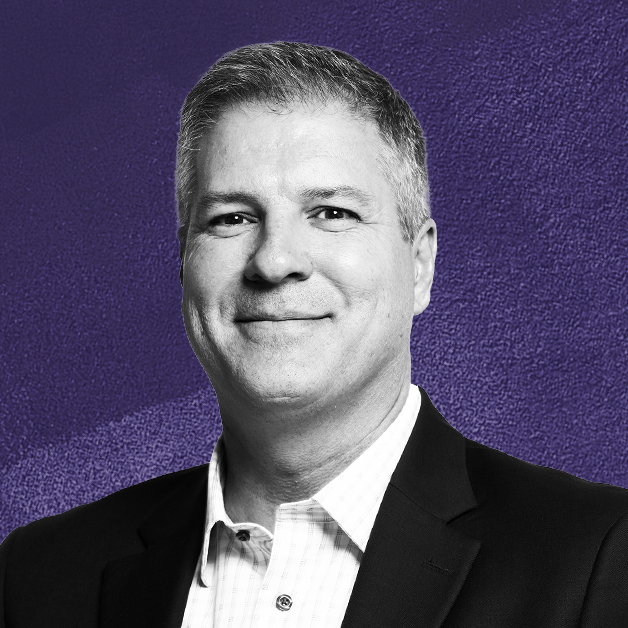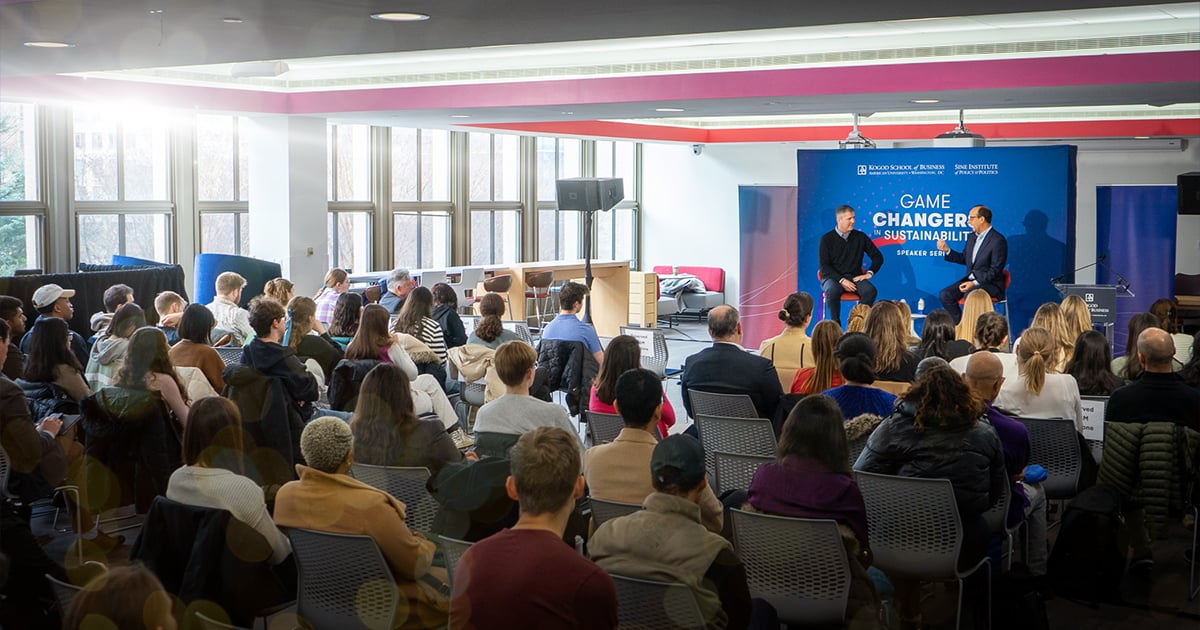
Kogod School of Business
As a business-to-business company, Xylem may not be a household name for many consumers. Still, its mission to help customers solve the world’s toughest water challenges has profoundly impacted millions worldwide.
The global water technology company also operates at the crossroads of many of the Kogod School of Business’ top interests and priorities, Kogod dean David Marchick said as he welcomed Xylem’s top executive to campus on February 13.
“Xylem is actually a company that is at the perfect intersection of everything we’re trying to do at Kogod because they’re one of the most innovative, dynamic companies at the nexus of sustainability, AI, and analytics,” Marchick said.
His remarks kicked off the first fireside chat of 2024 held as part of the Gamechangers in Sustainability speaker series, which explores how the world’s most innovative leaders work to create a more sustainable world.
Over the course of an hour-long discussion, Xylem CEO Matthew Pine explained how he, at the helm of this multi-billion dollar, DC-based conglomerate, does just that.
A Company Focused Entirely on Water
Launched in 2011, Xylem has built something of an empire around water, leveraging acquisitions to gain a foothold in seemingly every facet of cleaning, pumping, treating, analyzing, and delivering the world’s most precious resource.
Its client portfolio ranges from private companies to utilities and governments worldwide, and its responsibilities are equally vast in scope, from building large-scale water systems to honing in on problems and inefficiencies with commercial processes.
“Across the water chain, it gives us a competitive advantage over our competition because we can go to our customer and think holistically about services we provide, instead of just a specific product in the process,” Pine told the audience.
That versatility naturally means the company’s work takes many forms.
Xylem has, for instance, worked with technology companies to figure out how to recycle and reuse the average 1,500 gallons of water it takes to make a computer chip, helping them achieve net-neutral water usage reducing their costs and environmental footprint in the process.
Its analytical prowess helps it diagnose and predict leaks, whether working on a single building or a regional water system, reducing water waste in areas where, Pine noted, leakage rates can top 60 percent.
Increasingly, the company is supplementing its work with artificial intelligence.
A key example: the company does acoustical analysis to pinpoint leaks within a water system. The analysis process can take six weeks. Today, AI can analyze the data in as little as one week, allowing Xylem to deploy its human workers to other tasks.
“We’re using AI to remove bottlenecks and get the data to our customers more quickly,” Pine explained.
Xylem has also deployed digital twin technology, which works by essentially creating a virtual model of a physical object, Pine explained. This technology, combined with other processes used by Xylem, helped the company, through a joint venture partner, save four million cubic meters of water in the city of Valencia, Spain.
We’re using AI to solve this big problem around water scarcity."

Matthew Pine
CEO, Xylem
Unrelenting Interest in Sustainability
Notably, though, Xylem’s efforts around work in concert with efforts to conserve it and create a more sustainable world.
Today, a meaningful and growing portion of the company’s portfolio is focused on developing nations.
Speaking to the AU audience, Pine noted he recently returned from a trip to India where, he said, 90 percent of wastewater runs back into rivers and streams, introducing potential health hazards.
During his trip, he visited a small town outside Bangalore, where Xylem built a small water treatment center to deliver 1,000 liters of water per minute to a school housing 500 children.
By removing e-coli and other bacteria and contaminants, the company sees this as also removing a critical barrier to education since contaminated water has, historically, caused children to frequently miss school due to illness.
“Having a tremendous impact on that community while we’re there is important,” Pine said.
In 2020, Xylem issued a $1 billion green bond, with proceeds directed to projects improving water accessibility, affordability, and infrastructure resilience. A move to retire older debt and enhance liquidity during the pandemic, Xylem’s interest rate was tied to passing a sustainability-driven report card, Pine explained.
The company also touts its employee volunteer program, Watermark, which drew 90 percent participation in its workforce, with staff from the factory floor to the corner office providing pro-bono expertise to solve water challenges.
At a time when so many industries have faced staffing challenges, Pine told the audience that Xylem’s sustainability-driven mission has been a pull factor for prospective and current employees.
“It attracts talent. It retains talent,” Pine said.
We get up every morning thinking about how we serve customers in the most sustainable way we can.”

Matthew Pine
CEO, Xylem
It’s a sentiment that resonates at AU, the nation’s first research university to achieve carbon neutrality, and at Kogod, which offers a Master’s in Sustainability Management program unique to a business school, where students learn how to help companies tackle some of the most pressing issues faced today.
“Sustainability runs through everything we do,” Pine said. “Obviously, our products are focused on resiliency of businesses, affordability of water, tackling scarcity of water. It runs through everything we do.”
The discussion with Pine served as 2024’s first edition of the Gamechangers in Sustainability series. Since 2023, the series has allowed the Kogod and AU community to hear from innovative, change-driven leaders, building on the university’s commitment to sustainability through practice, curriculum, and culture.
